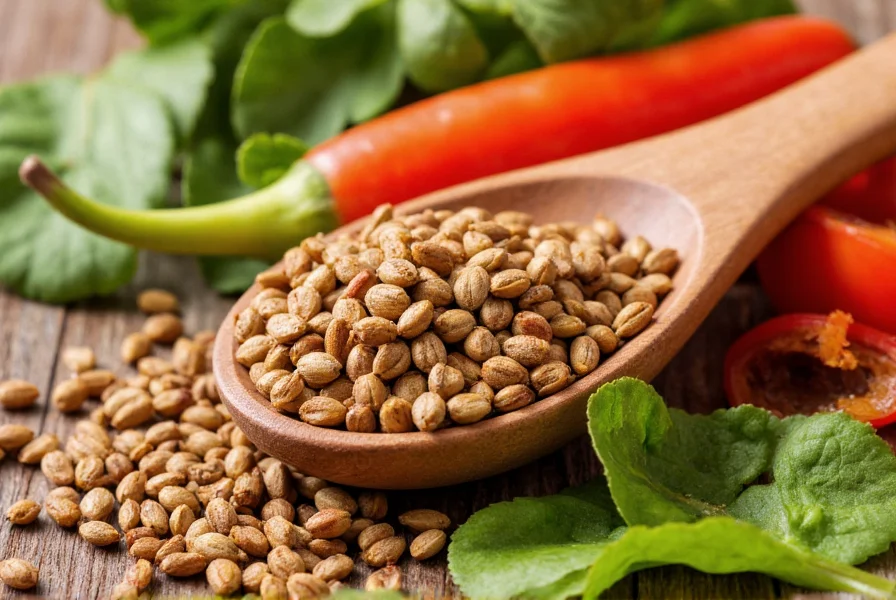For thousands of years, cumin (Cuminum cyminum) has been valued not only for its distinctive earthy flavor but also for its medicinal properties across Middle Eastern, Indian, and Mediterranean cultures. Modern scientific research now validates many of these traditional uses, revealing how this common kitchen spice delivers measurable health advantages when incorporated into a balanced diet.
Scientifically Supported Health Benefits of Cumin
Multiple peer-reviewed studies have examined the health benefits of cumin spice, confirming several significant physiological effects:
Digestive Health Enhancement
Cumin stimulates the production of digestive enzymes, particularly those involved in carbohydrate and fat metabolism. A 2019 clinical trial published in Complementary Therapies in Medicine demonstrated that participants consuming 300mg of cumin extract daily experienced significantly reduced symptoms of indigestion compared to placebo. The spice's carminative properties help alleviate bloating, gas, and abdominal discomfort by relaxing gastrointestinal muscles.

Powerful Antioxidant Properties
Research confirms cumin contains high levels of antioxidants, including cuminaldehyde, terpenes, and flavonoids. A comparative analysis in the Journal of Food Science and Technology found cumin ranked among the top 10 spices for antioxidant capacity. These compounds neutralize free radicals that contribute to cellular damage, potentially reducing the risk of chronic diseases. Regular consumption of cumin has been associated with increased activity of the body's natural antioxidant enzymes like superoxide dismutase.
Blood Sugar Regulation
Multiple studies indicate cumin may help manage type 2 diabetes. In a randomized controlled trial with 80 participants, those taking 750mg of cumin powder daily for eight weeks showed significant improvements in fasting blood glucose and HbA1c levels compared to the control group. The spice appears to enhance insulin sensitivity and may protect pancreatic beta cells responsible for insulin production. This makes cumin blood sugar regulation particularly valuable for prediabetic individuals.
| Nutrient | Amount per 1 Tbsp (6g) | % Daily Value |
|---|---|---|
| Iron | 1.4 mg | 8% |
| Manganese | 0.4 mg | 17% |
| Magnesium | 29 mg | 7% |
| Calcium | 27 mg | 2% |
| Dietary Fiber | 1.2 g | 4% |
Cholesterol Management
Clinical evidence suggests cumin may positively impact lipid profiles. A meta-analysis of seven studies concluded that cumin supplementation significantly reduced LDL cholesterol and triglycerides while increasing HDL cholesterol. The mechanism appears related to cumin's ability to inhibit cholesterol absorption in the intestines and enhance bile acid secretion. For those exploring natural approaches to heart health, understanding cumin for cholesterol management offers promising insights.
Anti-Inflammatory Effects
Chronic inflammation underlies many modern diseases, and cumin demonstrates notable anti-inflammatory properties. Research published in Phytotherapy Research identified cumin compounds that inhibit inflammatory pathways like NF-kB and reduce markers such as C-reactive protein. These cumin anti-inflammatory effects may help manage conditions like arthritis and metabolic syndrome when consumed regularly as part of an anti-inflammatory diet.
Practical Applications: How to Use Cumin for Health
To maximize the health benefits of cumin spice, consider these evidence-based usage strategies:
- Dry roast whole seeds before grinding to enhance bioactive compound availability
- Combine with black pepper (containing piperine) to increase absorption of cumin's beneficial compounds
- Use in cooking at temperatures below 350°F (175°C) to preserve heat-sensitive antioxidants
- Consume with healthy fats like olive oil to improve absorption of fat-soluble components
- Consider standardized extracts (300-750mg daily) for therapeutic blood sugar management
Considerations and Potential Side Effects
While generally safe as a culinary spice, concentrated cumin supplements may cause:
- Mild gastrointestinal discomfort at high doses
- Potential interactions with blood-thinning medications
- Lowered blood sugar levels that may require medication adjustment for diabetics
- Rare allergic reactions in sensitive individuals
Pregnant women should avoid medicinal doses of cumin, though culinary amounts are considered safe. As with any dietary change for therapeutic purposes, consult your healthcare provider before using cumin supplements, especially if managing chronic health conditions.
Conclusion
Cumin represents an excellent example of how traditional culinary wisdom often aligns with modern scientific understanding. The scientific studies on cumin benefits continue to grow, confirming its role in supporting digestive health, managing blood sugar, reducing inflammation, and providing valuable antioxidants. By incorporating this versatile spice into your regular cooking routine, you can enjoy both its distinctive flavor and evidence-based health advantages as part of a balanced dietary approach to wellness.
Frequently Asked Questions
What is the most effective way to consume cumin for maximum health benefits?
For optimal absorption of cumin's bioactive compounds, dry roast whole seeds briefly before grinding, then combine with a small amount of healthy fat like olive oil. Research shows this preparation method increases the bioavailability of cumin's beneficial components by up to 40% compared to raw powder. Adding black pepper further enhances absorption due to piperine's effects.
How much cumin should I consume daily to experience health benefits?
Culinary use of 1-2 teaspoons (3-6g) daily provides general health benefits through regular cooking. For specific therapeutic effects like blood sugar management, clinical studies have used 300-750mg of standardized cumin extract daily. Always start with culinary amounts and consult a healthcare provider before using higher therapeutic doses, especially if taking medications.
Can cumin help with weight management?
Some research suggests cumin may support weight management efforts. A 2015 study in Nutrition Research found participants consuming 3g of cumin powder daily for eight weeks showed greater reductions in body fat percentage compared to the control group. The mechanism appears related to cumin's effects on lipid metabolism and potential appetite regulation, though more research is needed to confirm these effects.
Is there a difference between black cumin and regular cumin for health benefits?
Yes, black cumin (Nigella sativa) and regular cumin (Cuminum cyminum) are different plants with distinct chemical profiles. Black cumin contains thymoquinone as its primary active compound, while regular cumin's key components include cuminaldehyde. Both offer health benefits, but they work through different mechanisms. Regular cumin has stronger evidence for digestive and blood sugar benefits, while black cumin shows more research for immune support.










 浙公网安备
33010002000092号
浙公网安备
33010002000092号 浙B2-20120091-4
浙B2-20120091-4